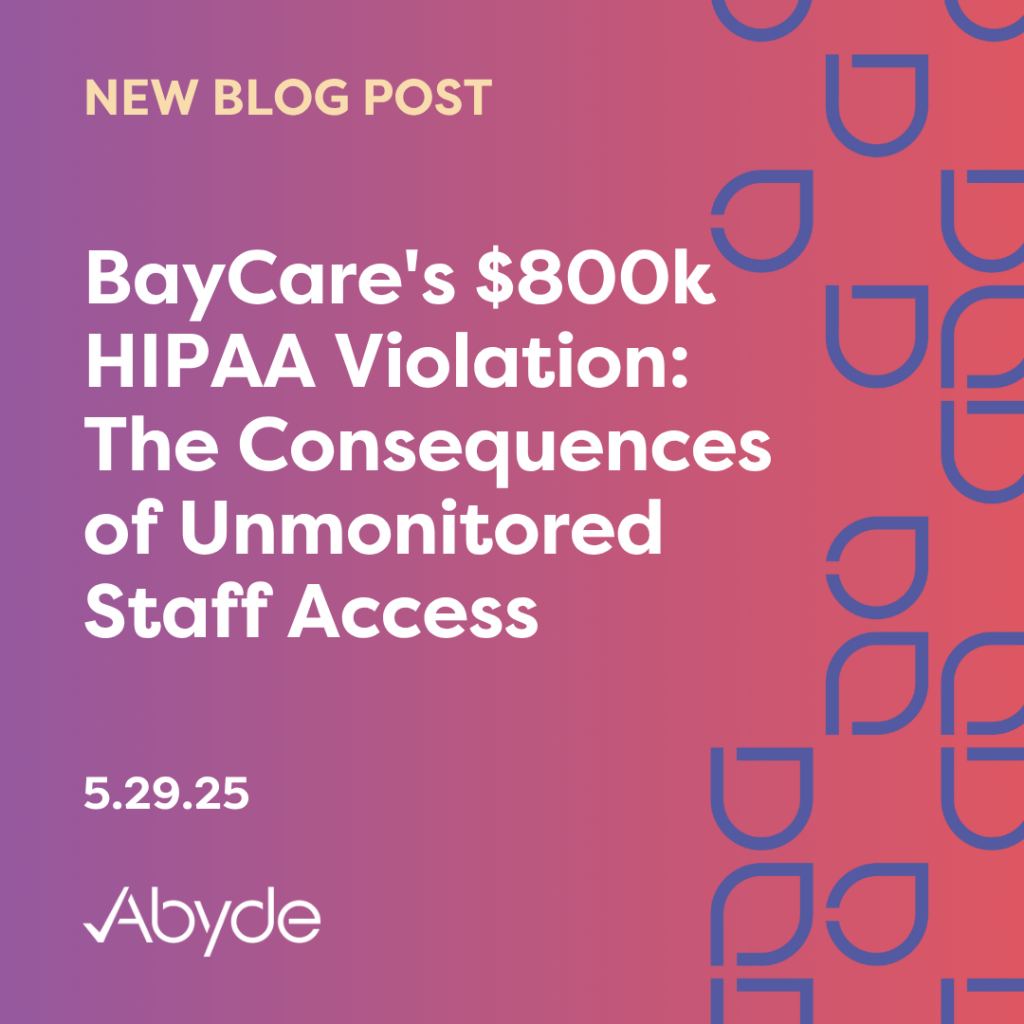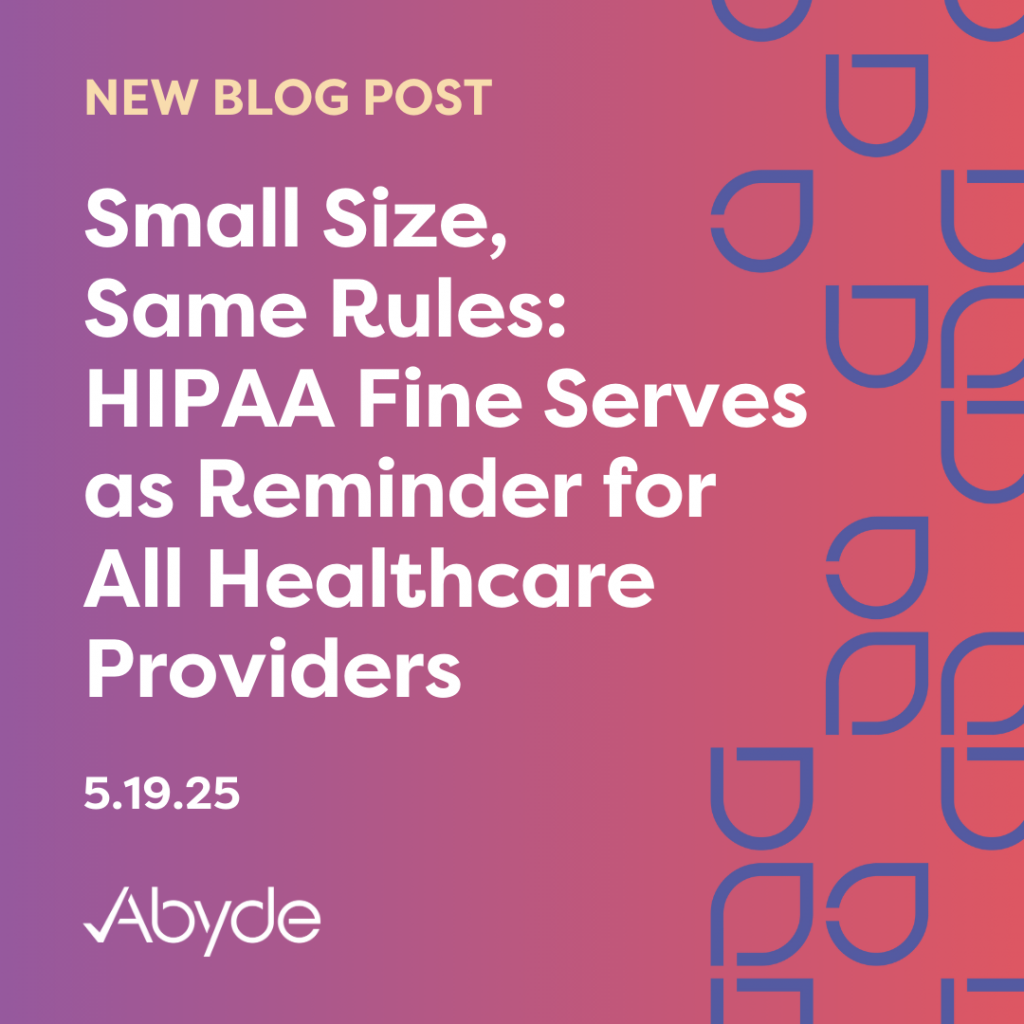May 29, 2025 It’s been a pivotal year for healthcare compliance. The largest ever healthcare data breach occurred at the beginning of 2024, and now the HHS Office for Civil Rights is reviewing and soon implementing new HIPAA legislation. Don’t worry; as an Abyde customer, we’ve got you covered. Our cloud-based software is rapidly updated with features to address the latest legislation. To help you keep up with all the compliance changes, Abyde is committed to providing an adaptable software platform to maintain compliance within an ever-changing regulatory environment. We’ve compiled a quick rundown of the most significant Abyde updates from the past year. These updates assist your practice in automating, simplifying, and streamlining compliance. Business Associate Accountability Abyde expanded our ecosystem with a new product, HIPAA for Business Associates, to serve the vendors of Covered Entities. Even if they don’t directly care for patients, they still play an essential role in keeping that information safe. Like your Abyde experience, Business Associates (BAs) now have a centralized hub for HIPAA responsibilities. With the Abyde for Business Associates solution, your BAs can take control of their compliance program. Your practice can also have peace of mind that the businesses you work with take compliance seriously. We’ve also made it easier to manage Business Associate Agreements (BAAs) within our Covered Entities software. Now, BAAs are dynamically updated to be location-specific. BAs can be assigned to one or more locations within multi-location accounts. This helps everyone stay accurate and accountable when handling PHI. Additionally, when completing your Security Risk Analysis (SRA), your BAs can now assist in answering questions with the new SRA Contributor feature. With the SRA Contributor, BAs or fellow staff can help answer questions you may be unsure of, allowing your practice to receive and review answers while completing the SRA. This enables your BA to provide support with technical questions and permits your practice to complete the SRA more quickly and accurately. Staying Ahead of the Latest Legislation Abyde is committed to proactively updating our software to maintain your practice’s compliance with evolving healthcare regulations. We’ve kept this commitment with our Compliance Task Force team, a team of our experts dedicated to thoroughly addressing new legislation. Our Compliance Task Force reviews and researches new legislation in advance, ensuring Abyde’s software remains compliant with the latest laws. One example is recent legislation on workplace violence. As healthcare staff is five times as likely to experience workplace violence compared to other workers, federal OSHA legislation is incoming. Abyde quickly updated its platform to reflect Cal/OSHA’s new Workplace Violence Prevention legislation, which requires substantial changes to compliance programs, such as new logs and training. Because Cal/OSHA’s rules frequently become federal standards, Abyde users gain the advantage of early compliance, ensuring they’re ready for future national mandates. In addition, we provided a webinar about these new requirements, ensuring all were aware of their responsibilities. Another major recent legislative change was introducing a reproductive healthcare attestation form. Initiated by the Biden administration, reproductive healthcare is handled separately, requiring additional paperwork to share PHI. While this update has been contested, practices are prepared with the additional paperwork in the Forms section of the Policies & Procedures module. Abyde software is tailored to federal and state laws. For example, we recently adjusted the New York Breach Notification Policy based on recent state regulations. Overall, Abyde’s software is equipped to deliver necessary updates promptly in response to new legislation. With new incoming legislation, like the updated Security Rule, it’s vital to use software that makes change easy. Training Tailored to Your Schedule We understand your time is valuable, so we’ve made managing your team’s HIPAA training easier than ever. Abyde’s training overhaul in the HIPAA solutions allows HCOs to schedule training. Training for the entire subscription year is now available up front, allowing HCOs to schedule it at their earliest convenience. If you prefer Abyde’s automated scheduling, worry not! The original cadence remains in place as a default. The new updates, tailored to your practice, also allow for training to be resent. For example, after a breach, reviewing training is key, as is ensuring staff are retrained on best practices to mitigate future risk. New training has also been revolutionized into three bite-sized pieces, making it more palatable for viewers to retain the information. The update also included structuring insights into three tabs in the training section in both HIPAA solutions to organize the videos easily. Abyde’s streamlined and simplified training process provides flexibility for your practice, empowering your team to create a training schedule that fits your availability. Reduce Risk for Your Practice Your practice was likely affected by the Change Healthcare Breach in the past year. This massive breach was a wake-up call for everyone in the healthcare industry. The fundamental security oversight was the absence of multi-factor authentication. As a result of this discovery, Abyde implemented MFA to access our solutions, following best practices. Now, a unique code will be sent when attempting to log into Abyde’s software. While this update might add a few seconds to your login routine, this extra layer of protection keeps your account secure. It also serves as a great reminder to review passwords and add MFA when possible. This additional cybersecurity measure will also likely become required as part of the new Security Rule updates. Making Abyde Even Easier If you ever need a quick refresher on the Abyde HIPAA for Covered Entities solution, we’ve recently implemented in-app explainer videos. These videos can be found throughout the software, providing a short video on each module. Get the answers you need instantly, right where you need them. These short clips ensure everyone feels confident navigating the solution, which means less time searching and more time focused on patient care. And remember, if you ever need any compliance assistance, the subscription includes access to our compliance experts. Abyde Updates – Protecting your Practice It’s been a busy year for HIPAA, with legislation updates,
BayCare’s $800k HIPAA Violation: The Consequences of Unmonitored Staff Access
May 29, 2025 A successful practice is built upon a strong foundation of well-trained and aware staff. Protecting patient data is a critical responsibility for healthcare staff. Data breaches involving Protected Health Information (PHI) can occur in many ways, but the foundation of security lies in a workforce committed to safeguarding it. A Florida healthcare provider, BayCare Health System, experienced the consequences of improper disclosure of PHI due to a complaint and a noncompliant staff member in the latest HIPAA fine. Acting Director of the Office for Civil Rights (OCR) Anthony Archeval commented on the importance of managing staff access, saying, “allowing unrestricted access to patient health information can create an attractive target for a malicious insider.” What Happened? In 2018, an unnamed complainant visited St. Joseph’s Hospital, a facility under the BayCare Health System, for an appointment. After treatment, she received communication from an unknown contact who sent the complainant photos of her medical records and a video of a BayCare associate scrolling through her file as well. This communication led to a complaint filed with the OCR. Several years of legal interactions and investigations by the OCR resulted in an $800,000 settlement six years later. After the investigation, it was found that BayCare failed to have procedures and policies for handling ePHI, failed to reduce risks, and did not review staff access. This nearly million-dollar fine resulted from a malicious insider, insufficient documentation, and an oversight of staff privileges. Reviewing staff access is vital for protecting patient data. By monitoring staff activity, you can ensure that PHI does not end up in the wrong hands. Additionally, when providing staff with access to PHI, confirm that access is necessary to complete essential job tasks. This falls under the Minimum Necessary Standard within the HIPAA Privacy Rule, which enforces that disclosed PHI is only shared for an authorized and required purpose. Staff must be thoroughly trained in their responsibilities before accessing PHI, and policies and procedures regarding handling PHI must be readily available for staff to review. While this situation did not lead to jail time, it is not unheard of in the medical field, so staff must also be aware of the consequences. Training and Monitoring Staff with Abyde Smart compliance solutions streamline training, policies and procedures, and monitoring access, creating a culture of compliance that protects your organization from malicious insiders. With an intelligent platform managing compliance, you can dynamically generate unique policies and procedures in seconds, automating this task without human error. Additionally, a centralized compliance hub allows staff to review documentation before working with patients and refer to it if there is any confusion. Access logs can also be found in this hub, which keeps staff accountable when they review patient PHI. With intelligent solutions, proactive compliance is made easy, encouraging staff to take their HIPAA responsibilities seriously. Speak with a compliance expert today to learn more about how compliance can be simplified for your practice.
Small Size, Same Rules: HIPAA Fine Serves as Reminder for All Healthcare Providers
May 19, 2025 HIPAA compliance is not just a recommendation; it’s a requirement, no matter how small your organization is. The latest HIPAA fine is a testament to this, with Vision Upright MRI the latest practice to be penalized. The small California MRI center experienced a significant breach, which exposed several violations in the fallout. Acting Office for Civil Rights (OCR) Director Anthony Archeval emphasized the widespread cybersecurity risks, noting that these threats impact healthcare providers of all sizes: “Cybersecurity threats affect large and small covered healthcare providers.” Vision Upright MRI was fined $5,000 and will now face a two-year Corrective Action Plan (CAP), being monitored by the OCR. This fine showcases that no practice, big or small, must be followed to keep patient data safe. What Happened? At the end of 2020, Vision Upright MRI experienced a breach in its systems due to an insecure server. This cybercrime exposed over 21,000 patients’ medical images, leading to the OCR’s investigation. The investigation discovered that the MRI center had never completed a Security Risk Analysis (SRA). The SRA thoroughly examines a practice, reviewing all current safeguards to secure Protected Health Information (PHI). These safeguards can include physical barriers the practice has implemented, like locked doors and alarms, and the administrative techniques the practice follows, like routinely checking access to sensitive patient data. The SRA is critical for a compliant practice and should be completed annually and after any breaches. While the SRA is a fundamental requirement for a practice, it is unfortunately often overlooked. The OCR has implemented a Risk Analysis Initiative to ensure practices are completing this requirement, and has reinstated the audit program, reviewing if regulated entities are maintaining this document. In addition to missing the SRA, Vision Upright MRI did not properly notify affected parties within 60 days, violating the Breach Notification Rule. The Breach Notification Rule requires practices to notify patients within 60 days of discovering a breach, regardless of how many were impacted. This short timeline allows patients to take the necessary precautions for the safety of their data. The practice should also provide credit monitoring. Since this event impacted well over 500 patients, the threshold to consider the situation a large breach, Vision Upright MRI also needed to notify the media and the OCR within a 60-day timeline. Communicating this is imperative, allowing the OCR to swiftly begin its investigation and potentially affected patients to receive information through media channels. These serious missteps led to the monetary settlement and years of government monitoring. Streamlining HIPAA Compliance Even a small practice doesn’t require overwhelming resources to be HIPAA compliant. The right compliance program can simplify HIPAA compliance. With smart solutions, the SRA can be completed easily, reviewing questions and potential vulnerabilities the practice faces. Additionally, breaches can be reported in intelligent software, with compliance experts assisting practices through alerting patients and the OCR. Meet with an expert today to learn how to automate your compliance program.
A Dentist’s Guide to OSHA Compliance
May 15, 2025 On a global scale, more than 2 million healthcare workers experience needle-stick injuries on an annual basis. Dentists are at the most at risk, with 59% of dentists studied experiencing needle stick injuries. Dentists are particularly susceptible to OSHA violations due to the daily use of sharps and the increased possible exposure to bloodborne pathogens and saliva when working in patients’ mouths. Protecting your dental team through safety and compliance isn’t just a good idea—it’s essential. Here’s a clear look at the standard preventive measures for OSHA in dentistry. First Line of Defense: Training There are numerous safety precautions to keep staff safe, but the first layer of protection is proper training and procedures. Before working with patients, staff must be thoroughly trained on the possible risks and mitigation techniques. Staff must also be provided a walk-through of the practice, assuring they know where all emergency equipment and exits are located. Training programs must review all possible risks, like sharps, bloodborne pathogens, radiation, etc. Videos and training materials must be easily accessible for staff to review. All relevant policies outlining compliant procedures for various situations must also be accessible to all staff members. Training is the foundation of a compliant practice, and with proper OSHA in dentistry training, your staff can feel confident handling any situation. Always Wear Personal Protective Equipment While it might not always be the most fashionable decision, wearing Personal Protective Equipment (PPE) is imperative to keep staff safe. It is key that staff always wear PPE when working with patients. PPE can be defined as gloves, masks, gowns, face shields, and more. By wearing PPE, your staff have a barrier when working with patients, minimizing the risks of exposure. PPE must be provided to staff free of charge, cultivating a safe environment. Staff must also be appropriately trained to use PPE when working with patients, ensuring all know the necessary steps to protect themselves. PPE minimizes exposure to risks by limiting contact with patients, and is a staple for a safe healthcare practice. Stay Sharp: Handling Needles Carefully Dentists are well aware of the risks associated with working with needles, scalers, and other sharps. Use sharps carefully and utilize devices with safety features when working with sharps. Many sharps have preventative measures, like retractable needles after use, self-sheathing blades, and reinforced containers for sharps. When using sharps, ensure your staff wear gloves and other applicable PPE. Sharps handling, from initial use on a patient to disposal, requires strict adherence to safety protocols to minimize the risk of accidental sticks and the transmission of bloodborne pathogens. Bloodborne Pathogens 101 Working in healthcare, especially dentistry, puts staff at risk for exposure to bloodborne pathogens. Bloodborne pathogens are microorganisms that cause disease, like hepatitis B, C, and HIV. The World Health Organization states that 3 million healthcare workers are exposed to bloodborne diseases through skin puncture injuries each year. With PPE and appropriate sharps equipment, your staff is already significantly mitigating risk. However, if a sharp needle or blade pricks a staff member, it is essential to receive First Aid to protect the wound immediately. The staff member should have their blood tested as soon as possible. Depending on the situation, time is of the essence after a sharps incident. Some diseases, like HIV, can be prevented within 3 days of exposure. While it can be overwhelming, staff must stay calm and follow the proper procedures after an incident, with most sharps incidents not resulting in an infection. Simplifying OSHA Compliance As you can see, handling OSHA compliance in dentistry can be daunting. With the correct compliance program to address numerous risks, your dental staff can feel secure and concentrate on delivering excellent patient care. Intelligent OSHA software offers automatically generated policies, required forms, and training resources in a centralized compliance hub, providing a documented compliance program for your team. Meet with a compliance expert today to learn more about how you can streamline your OSHA compliance program.



